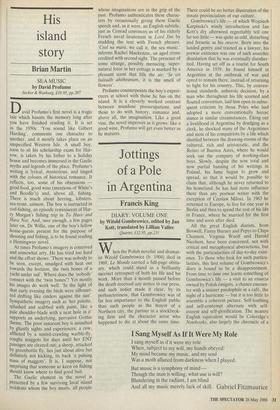His island story
Brian Martin
SEA MUSIC by David Profumo
Secker & Warburg, £10.95, pp.207
David Profumo's first novel is a tragic tale which haunts the memory long after you have finished reading it. It is set in the 1950s: 'You sound like Gilbert Harding', comments one character to another, and it mostly takes place on an unspecified Western Isle. A small boy, soon to sit his scholarship exam for Har- row, is taken by his father to a holiday house and becomes immersed in the Gaelic myths and legends of the place. Profumo's writing is lyrical, mysterious, and tinged with the colours of historical romance. It reflects, too, some of his obsessions good food, good wine (mentions of White's and Boodle's) and, above all, fishing. There is much about herring, lobsters, sea-trout, salmon. The boy is instructed in cod-fishing, an episode reminiscent of Har- ry Morgan's fishing trip in To Have and Have Not. And, sure enough, a few pages later on, Dr Willis, one of the boy's fellow house-guests present for the purpose of shooting and fishing, is to be found reading a Hemingway novel.
At times Profumo's imagery is contrived and somewhat arty. He has tried too hard and the effort shows: 'There was nobody to be seen, except, smudged with heat out towards the horizon, the twin bones of a yacht under sail'. Where does the 'nobody' connect with the 'twin bones'? Yet mostly his images do work well: 'In the light of that early evening the birds were silhouet- ted drifting like cinders against the sun'. Sympathetic imagery such as 'her palette, splashed and scabbed with paint, like a pale shoulder-blade with a neat hole in it' supports an underlying, pervasive Gothic theme. The poor innocent boy is assaulted by ghastly sights and experiences: a cow, afflicted by a nostril-crawling warble-fly, coughs maggots for days until her ENT passages are cleared out; a sheep, attacked by greenbottle fly, lies just about alive but definitely not kicking, its back 'a pulsing mass of maggots'. It is, I suppose, not surprising that someone so keen on fishing should know where to find good bait.
The Gaelic element in the novel is presented by a few surviving local island residents whom the boy meets, all people
whose imaginations are in the grip of the past. Profumo authenticates these charac- ters by occasionally giving them Gaelic speech and, as it were, an English subtitle, just as Conrad convinces us of his elderly French naval lieutenant in Lord Jim by studding the text with French phrases. `Ceol na mara, we call it, the sea music,' informs Rachel Mackenzie, an aged crone credited with second sight. The presence of some strange, possibly menacing, super- natural force in her cottage is marked by a pleasant scent that fills the air: 'Se sin faileadh ahitheanum, it is the smell of flowers'.
Profumo counterpoints the boy's experi- ences at school with those he has on the island. It is a cleverly worked contrast between mundane preoccupations and those to do with history, romance and, above all, the imagination. Like a good vine, the novel improves as it grows: like a good wine, Profumo will get even better as he matures.


















































 Previous page
Previous page